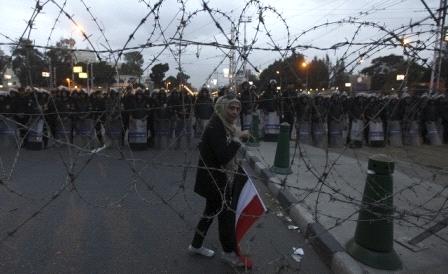Ammon News - By AL ARABIYA WITH AFP
Hundreds of protesters woke up Wednesday in front of the presidential palace, the new focus of protests against President Mohamed Mursi, as an already-polarized Egypt slipped deeper into crisis.
“The final warning, the presidency under siege,” read the headline of daily al-Shuruk as the independent Al-Watan declared “Revolution at the president’s doorstep.”
On Tuesday, tens of the thousands marched on the upscale neighborhood of Heliopolis, culminating in a dramatic siege of the palace, in scenes not witnessed even during demonstrations that toppled Hosni Mubarak last year.
Hundreds more Mursi opponents spent the night in Cairo’s iconic Tahrir Square under dozens of tents erected almost two weeks ago.
Activists used social networking sites to appeal for blankets and food for the protesters who said they won’t leave until Mursi rescinds a decree expanding his powers.
Tuesday’s protests were the latest in a string of actions opposed to Mursi’s Nov. 22 decree, which expanded his powers and enabled him to call a mid-December referendum on a draft constitution drawn up by an Islamist-dominated panel and rejected by liberals, leftists and Christians.
“Why did he do all this? He’s supposed to be a president for all Egyptians, not just for the Muslim Brotherhood,” said a protester said at the presidential palace.
The draft constitution has become the focal point of a political and ideological battle between Islamists and the largely secular-leaning opposition.
Egyptian police battled thousands of protesters outside President Mohamed Mursi’s palace in Cairo on Tuesday, prompting the Islamist leader to leave the building, presidency sources said.
Officers fired teargas at up to 10,000 demonstrators angered by Mursi’s drive to hold a referendum on a new constitution on Dec. 15. Some broke through police lines around his palace and protested next to the perimeter wall.
The crowds had gathered nearby in what organizers had dubbed “last warning” protests against Mursi, who infuriated opponents with a Nov. 22 decree that expanded his powers. “The people want the downfall of the regime,” the demonstrators chanted.
“The president left the palace,” a presidential source, who declined to be named, told Reuters. A security source at the presidency also said the president had departed.
The United States on Tuesday appealed for restraint on both sides in Egypt as supporters and opponents of Mursi clashed during nationwide protests.
“We would simply urge that protesters express their views peacefully and that they be given the environment, if you will, to protest peacefully,” AFP reported State Department spokesman Mark Toner as saying.
Toner acknowledged that tensions were high Cairo, where thousands of people surrounded the presidential palace to denounce a decree expanding Mursi’s powers and placing him beyond judicial oversight.
Toner stressed that the Egyptian people should have the opportunity to express themselves on a new constitution that is moving toward a referendum on Dec. 15.
“In the coming days, it’s going to be important that they have an opportunity to express their views, as I said, peacefully, and ultimately that they are able to express their views in a vote, in a peaceful and secure environment,” Toner said.
Opponents of Islamist President Mursi marched on the presidential palace on Tuesday to protest his power grab and a controversial draft charter, as the country plunged deeper into crisis.
Anti-Mursi protesters, who clashed with Egypt’s riot police, removed barricades from in front the presidential palace, Al Arabiya correspondent reported. Around 10 protesters were injured after the clashes, the correspondent added.
Thousands took to the streets waving Egyptian flags, chanting for the downfall of the regime and denouncing the Muslim Brotherhood, from which Mursi emerged, for having “sold the revolution” that toppled Hosni Mubarak last year.
Egypt Judges Club Chairman Counselor Ahmad al-Zind told reporters in a press conference held on Tuesday that judges in the country will boycott the referendum if Mursi’s expected constitutional declaration was not canceled.
Zind defended Egypt’s judges by describing them as “transparent” and having no “personal interests” in the current crisis, which he dubbed as “imposing.”
Islamists have long suspected Egypt’s judges as not “independent” and collaborators with the former regime.
